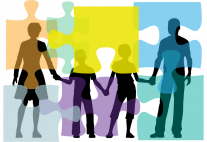Description (Related:1)
(Source: NIMH) If you or someone you know has a mental illness, is struggling emotionally, or has concerns about their mental health, there are ways to get help. Use these resources to find help for you, a friend, or a family member.
Get Immediate Help in a Crisis
Call 911 if you or someone you know is in immediate danger or go to the nearest emergency room.
National Suicide Prevention Lifeline
Call 1-800-273-TALK (8255); En Espaol 1-888-628-9454
The Lifeline is a free, confidential crisis hotline that is available to everyone 24 hours a day, seven days a week. The Lifeline connects callers to the nearest crisis center in the Lifeline national network. These centers provide crisis counseling and mental health referrals. People who are deaf, hard of hearing, or have hearing loss can contact the Lifeline via TTY at 1-800-799-4889.
Crisis Text Line
Text HELLO to 741741
The Crisis Text hotline is available 24 hours a day, seven days a week throughout the U.S. The Crisis Text Line serves anyone, in any type of crisis, connecting them with a crisis counselor who can provide support and information.
Veterans Crisis Line
Call 1-800-273-TALK (8255) and press 1 or text to 838255
The Veterans Crisis Line is a free, confidential resource that connects veterans 24 hours a day, seven days a week with a trained responder. The service is available to all veterans, even if they are not registered with the VA or enrolled in VA healthcare. People who are deaf, hard of hearing, or have hearing loss can call 1-800-799-4889.
Disaster Distress Helpline
Call 1-800-985-5990 or text TalkWithUs to 66746
The disaster distress helpline provides immediate crisis counseling for people who are experiencing emotional distress related to any natural or human-caused disaster. The helpline is free, multilingual, confidential, and available 24 hours a day, seven days a week.
Contact social media outlets directly if you are concerned about a friends social media updates or dial 911 in an emergency.
View the NIMH 5 action steps for helping someone in emotional pain infographic to see how you can help those in distress.
Find a Health Care Provider or Treatment
Treatment for mental illnesses usually consists of therapy, medication, or a combination of the two. Treatment can be given in person or through a phone or computer (telehealth). It can sometimes be difficult to know where to start when looking for mental health care, but there are many ways to find a provider who will meet your needs.
Primary Care Provider: Your primary care practitioner can be an important resource, providing initial mental health screenings and referrals to mental health specialists. If you have an appointment with your primary care provider, consider bringing up your mental health concerns and asking for help.
Federal Resources: Some federal agencies offer resources for identifying health care providers and help in finding low-cost health services. These include:
Substance Abuse and Mental Health Services Administration (SAMHSA): For general information on mental health and to locate treatment services in your area, call the SAMHSA Treatment Referral Helpline at 1-800-662-HELP (4357). SAMHSA also has a Behavioral Health Treatment Locator on its website that can be searched by location.
...and more
Card
Media Related LinkOut
Remarks
Health Circle Join the conversation
Health Circle = Social well-beingAbout Us
Health is: "a state characterized by anatomic, physiologic, and psychological integrity; ability to perform personally valued family, work, and community roles; ability to deal with physical, biological, psychological, and social stress"
Contact
Address: , , , 94024
Web Site Address: https://mbicircle.com/healthcircle
E-mail: micheleellieahi@gmail.com


